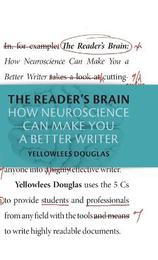
|
The Reader's Brain: How Neuroscience Can Make You a Better Writer
Hardback
Main Details
| Title |
The Reader's Brain: How Neuroscience Can Make You a Better Writer
|
| Authors and Contributors |
By (author) Yellowlees Douglas
|
| Physical Properties |
| Format:Hardback | | Pages:225 | | Dimensions(mm): Height 205,Width 135 |
|
| Category/Genre | linguistics |
|---|
| ISBN/Barcode |
9781107100398
|
| Classifications | Dewey:808.0019 |
|---|
| Audience | | Tertiary Education (US: College) | | Professional & Vocational | |
|---|
| Illustrations |
1 Line drawings, black and white
|
|
Publishing Details |
| Publisher |
Cambridge University Press
|
| Imprint |
Cambridge University Press
|
| Publication Date |
11 June 2015 |
| Publication Country |
United Kingdom
|
Description
Have you ever found yourself re-reading the same sentence four or five times and thought 'I should get more sleep'? Are you clueless as to why one paragraph just seems to 'flow' while you simply can't recall the contents of another? Guess what: you are not alone. Even the best writers fail to grasp why their writing works. The Reader's Brain is the first science-based guide to writing, employing cutting-edge research on how our minds process written language, to ensure your writing can be read quickly, assimilated easily, and recalled precisely - exactly what we need to transform anyone into a highly effective writer. Using the 5Cs - clarity, continuity, coherence, concision, and cadence - this book combines irreverent humour with easy-to-follow principles that will make readers perceive your sentences, paragraphs, and documents to be clear, concise, and effective.
Author Biography
Yellowlees Douglas is Associate Professor of Management Communication at the University of Florida.
Reviews'There is a lot to like in this book, not least the pragmatic examples, acerbic humor, and insights into why some writing is impenetrable.' Vint Cerf, internet pioneer and Vice President, Google 'Be warned: if you read this book, you'll see how flawed your writing is. But take heart too, because if you follow Douglas' advice, those flaws will start to disappear. Her bracing, mordant and lucid words show that good writing is a skill you can learn - and that the best way to do it is not to defer to grammarians and style gurus but to understand what goes on in the mind of the reader. In other words, you should write to be read. This book offers some of the best advice on writing that I have seen, whether you are writing a legal document or an email to your mother.' Philip Ball, science writer and author of The Music Instinct 'This book is desperately needed across great swaths of corporate America and should be taught at every level from K-12 to graduate schools.' Andrew Hargadon, Soderquist Chair in Entrepreneurship, Graduate School of Management, University of California, Davis
|